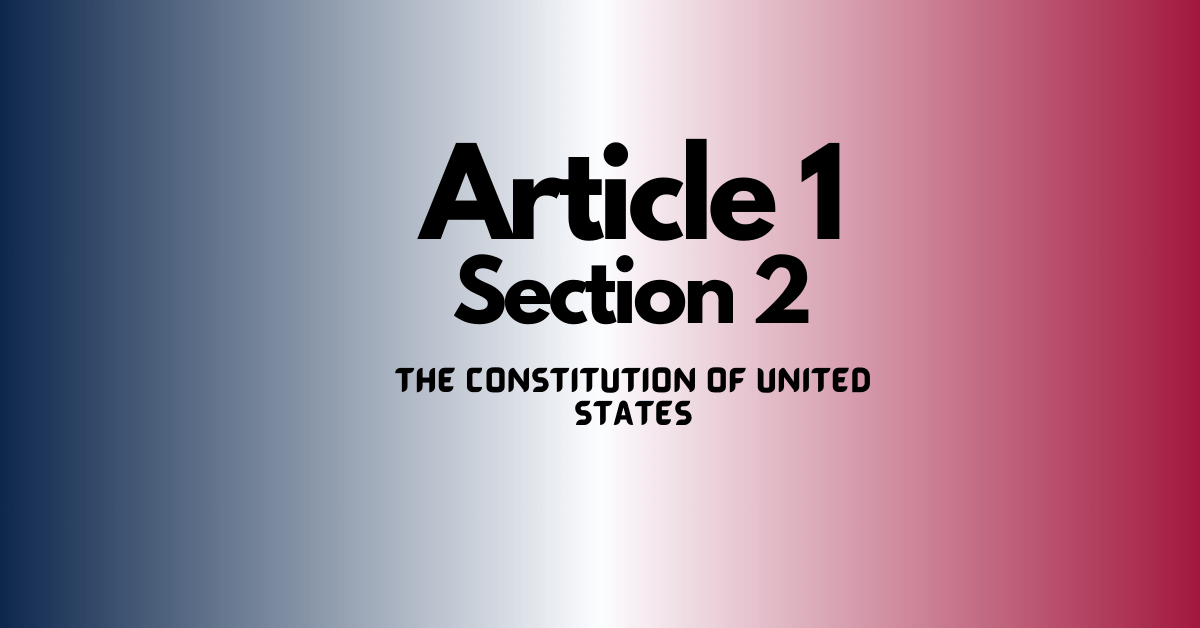Article 1 , Section 1 (Original text):
The House of Representatives shall be composed of Members chosen every second Year by the People of the several States, and the Electors in each State shall have the Qualifications requisite for Electors of the most numerous Branch of the State Legislature. No Person shall be a Representative who shall not have
attained to the Age of twenty five Years, and been seven Years a Citizen of the United States, and who shall not, when elected, be an Inhabitant of that State in which he
shall be chosen.
[Representatives and direct Taxes shall be apportioned among the several States which may be included within this Union, according to their respective Numbers, which shall be determined by adding to the whole Number of free Persons, including those bound to Service for a Term of Years, and excluding Indians not taxed, three fifths of all other Persons.]
The actual Enumeration shall be made within three Years after the first Meeting of the Congress of the United States, and within every subsequent Term of ten Years, in such Manner as they shall by Law direct.
The Number of Representatives shall not exceed one for every thirty Thousand, but each State shall have at Least one Representative; and until such enumeration shall be made, the State of New Hampshire shall be entitled to chuse three, Massachusetts eight, Rhode-Island and Providence Plantations one, Connecticut five, New-York six, New Jersey four, Pennsylvania eight, Delaware one, Maryland six, Virginia ten, North Carolina five, South Carolina five, and Georgia three. When vacancies happen in the Representation from any State, the Executive Authority thereof shall issue Writs of Election to fill such Vacancies. The House of Representatives shall chuse their Speaker and other Officers; and shall have the sole Power of Impeachment.
Explanation:
This section of the Constitution outlines the structure, qualifications, apportionment, and initial representation of the House of Representatives, as well as procedures for vacancies and the election of the Speaker.
Composition of the House of Representatives
- The House of Representatives is composed of members chosen every second year by the people of the several states.
- The electors in each state must meet the qualifications required for electors of the most numerous branch of the state legislature.
Qualifications for Representatives
- A person must be at least twenty-five years old to be eligible to serve as a Representative.
- They must have been a citizen of the United States for at least seven years.
- They must be an inhabitant of the state they are elected to represent at the time of their election.
Apportionment of Representatives
- Representatives and direct taxes are apportioned among the states according to their respective numbers.
- The number of representatives for each state is determined by adding the whole number of free persons, including those bound to service for a term of years, and excluding Indians not taxed, plus three-fifths of all other persons (a reference to the Three-Fifths Compromise, which counted enslaved individuals as three-fifths of a person for representation and taxation purposes).
- An actual enumeration (census) of the population must be conducted within three years after the first meeting of Congress and every subsequent ten years thereafter.
- The number of representatives shall not exceed one for every thirty thousand people.
- Each state must have at least one representative.
Initial Representation
- Until the first enumeration is completed, specific states are entitled to a certain number of representatives:
- New Hampshire: 3 representatives
- Massachusetts: 8 representatives
- Rhode Island and Providence Plantations: 1 representative
- Connecticut: 5 representatives
- New York: 6 representatives
- New Jersey: 4 representatives
- Pennsylvania: 8 representatives
- Delaware: 1 representative
- Maryland: 6 representatives
- Virginia: 10 representatives
- North Carolina: 5 representatives
- South Carolina: 5 representatives
- Georgia: 3 representatives
Vacancies and Speaker Election
- When vacancies occur in the representation from any state, the executive authority of that state shall issue writs of election to fill such vacancies.
- The House of Representatives has the power to choose their Speaker and other officers.
- The House of Representatives has the sole power of impeachment.
FEEL FREE TO ASK DOUBTS ON THE TOPIC IN THE COMMENTS BELOW.

Simply desire to say your article is as astonishing. The clearness in your post is just great and i could assume you are an expert on this subject. Fine with your permission let me to grab your RSS feed to keep updated with forthcoming post. Thanks a million and please continue the gratifying work.
I appreciate your generosity, The comment made me happy. I assume you are interested in studying The Constitution of US. I created a followable feed for you [ https://follow.it/politechscience-1 ] go to this link , follow us there and you will receive weekly updates. In case you are interested in studying constitution of other countries as well please join [ https://follow.it/politechscience ]. As per your ask here is the main RSS feed link [ https://politechscience.com/feed/ ]. Let me know, in case you have any difficulty joining us. Stay connected and Keep learning.